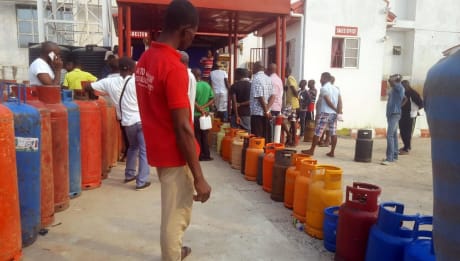As Nigeria advocates use of clean energy amidst sky-rocketing gas price
Story from Abah ADAH, Abuja
What a paradoxical scenario in Nigeria! In line with the global transition from carbon-emitting energy sources to clean sources in response to the threat of global warming, Nigeria has been intensifying its clean energy campaign in recent times, calling on households to switch to cooking with liquefied petroleum gas (LPG) popularly known as cooking gas.
And no doubt the campaign is paying off as more Nigerians are now leaving kerosene for gas, claiming kerosene is more expensive and get exhausted quicker than one can ever imagine. But the flip-side of this development remains that this teeming patronage would certainly pull the string of the market forces of demand and supply.
READ ALSO: CBN spent N58.6billion to print 2.5billion Naira notes in 2020 – Report
In other words, the interplay between demand and supply which is characteristic of a free market (capitalist) economy must be experienced, meaning that more people using gas means higher demand which, naturally, should affect pricing negatively. This is one outstanding factor, among others, that ought to be carefully considered and taken care of at the outset of the clean energy campaign and nipped in the bud.
READ ALSO: Senate summons Emefiele, SEC DG over cryptocurrency ban
There is no doubt that the US dollar-naira (USD-N) exchange rate which is nowhere close to favouring the naira catalysis the price movement of not only cooking gas but also all other marketable commodities within the economy. The exchange rate regime and the valuation of Naira against the USD impact directly on the price of LPG in the domestic market.
Though the Nigerian Liquefied Natural Gas (NLNG), through the export of LNG and NGL (natural gas liquids) abroad, gets the much-needed foreign exchange for the country, the import of LPG by independent marketers, which even outweighs the export in terms of quantity of gas, depletes the foreign reserve, and this has a negative balance of payment implications.
Nigeria gets a little over 450,000 metric tonnes of LPG from its liquefaction company, the NLNG, co-owned with the nation by three international oil companies, while the actual domestic demand stands at 1.3 million metric tonnes, leaving a shortfall of 850,000 metric tonnes. NLNG is said to be supplying 40 per cent of domestic demand such that the balance is provided through other domestic producers or via imports. Therefore, NLNG’s production alone is not sufficient.
The statistics have it that over one million metric tonnes of LPG were consumed by Nigerians in 2020, with over 50 per cent of the product imported by marketers. The implication is that we are a major importer of LPG and exposed to the vagaries of market forces and traders’ insatiable appetite for profit.
Another point is that LPG is a product priced in the international market.
The vagaries of the price fluctuations in the global market affect the price of domestic LPG because over 50 per cent of LPG sold in Nigeria are imported from abroad and priced in US Dollars. Prices of gas keep soaring at the international market with consequential impact on the local market. Between January and August, the prices of 5 kilogrammes (kg) and 12 kg cylinders of gas rose by about 300, if not more, per cent.
Introduction of 7.5 per cent Value Added Tax (VAT), devaluation of Naira to mention but a few have also been adduced as contributory factors.
The continuous rise in the price of cooking gas is a pointer to the fact that everything is wrong with Nigeria’s economy and our economy handlers. Cooking gas is essentially needed every day by the people in both urban, semi-urban, and rural settings. Nigeria has crude gas in abundance, with the world’s ninth-largest reserve (about 207 trillion standard cubic feet, as of 2019), which is equally a source of clean energy that Nigeria is advocating for many of its citizens to change to. Aside from its use as a cooking fuel, LPG is used to power appliances, some vehicles, and a number of small businesses depend on it. So whatever happens to LPG now affects almost all families in one way or the other.
Today, many Nigerians are groaning over the unprecedented high price at which gas dealers are selling the product, even as there are indications that the price of gas is still climbing. As it is now, a common six kg of gas sells in the region of N4,000, and it can only be used for about two weeks by an average household. So one wonders where the difference is between the use of gas and the use of kerosene which is also on the same high price level. The implication is that the development is likely to do a disservice to the clean energy campaign as people may be forced to embrace the traditional sources of energy-firewood, charcoal, etc.
After all, many homes, especially at the urban level, have now resorted to the hybrid sources of energy, using gas and charcoal alternatively. In the face of an economy that is shrinking by the day both at micro and macro levels, this is just a one-minute aspect that is compounding the myriad of challenges making Nigerians suffer hopelessly on all fronts in their abundantly endowed land space ranging from debilitating insecurity, extreme poverty, hyperinflation, high cost of food and essential consumables, giving birth to diminishing trust in government and its institutions at all levels, even as there is still no clarity on the way forward.
Every day the quality of life for the average Nigerian is depreciating, to the extent that many people give it to fate, hoping for divine salvation, even as some take life in frustration. The level of disillusionment is mind-boggling as economic uncertainties continue to loom larger by the day amidst the fallout of the global coronavirus pandemic (COVID-19).
Given the importance of LPG in the lives of the people and the critical role it plays as a clean energy source, the government ought to proactively plan out how to cushion the effect of all the aforementioned contributory factors. After all, the most essential responsibility of the government is to guarantee socio-economic security and welfare to its citizens.
Government should explore different mitigation options while taking steps to ensure gradual downward movement in the price of LPG (cooking gas) to a middle point whereby consumers will not be paying through their nose in the face of the economic crunch and the business interest of gas dealers will not jeopardise while working towards sufficient local production to meet local demand and even export excesses to other needy countries.
Abah Sunday Adah is a member of the Nigerian Union of Journalists based in Abuja.
Follow the Neptune Prime channel on WhatsApp:
Do you have breaking news, interview request, opinion, suggestion, or want your event covered? Email us at neptuneprime2233@gmail.com





